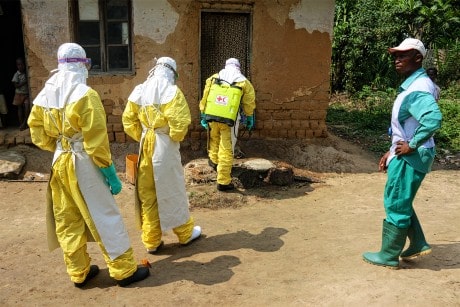When the COVID-19 pandemic broke out, the Democratic Republic of the Congo (DRC) knew what to do. It was one of the few benefits to come out of the country’s previous experience with Ebola.
For nearly two years now, this country of 100 million has been grappling with one of the worst Ebola epidemics in history. Like COVID, this infectious disease has no cure, despite significant breakthroughs. The virus, which has claimed over 2,260 lives in this one wave alone, was fortunately under control when the COVID-19 pandemic began.
 Since mid-January, the health checkpoints that had been set up at airports, ports, and border crossings across this vast country — the second largest on the continent after Algeria — to prevent the spread of Ebola are being used for COVID-19. Hygiene promotion campaigns were already underway in most provinces — a step that was useful for both viruses. And since laboratories already had the equipment they needed, the DRC was one of the first 20 African countries to be able to screen for COVID-19.
Since mid-January, the health checkpoints that had been set up at airports, ports, and border crossings across this vast country — the second largest on the continent after Algeria — to prevent the spread of Ebola are being used for COVID-19. Hygiene promotion campaigns were already underway in most provinces — a step that was useful for both viruses. And since laboratories already had the equipment they needed, the DRC was one of the first 20 African countries to be able to screen for COVID-19.One of the key lessons learned from Ebola was the importance of mental health. “It has to be addressed as soon as the epidemic starts,” says psychologist Oléa Balayulu Makila, who is part of the government team that is leading the COVID-19 response in the DRC.
This reduces the harm to sick people and their loved ones, of course, but also limits the spread. Ebola, much like COVID-19, elicits a “generalized fear” in the population that can cause “denial” of the disease or even “violence” against patients or care providers. “This behaviour increases the risk of infection”, which is why the psychologist says that it’s so important to address it from the very beginning.
That said, providing psychological support during an epidemic is no easy task. Just think about the first appointment, which sometimes has to be done with a mask, gloves, and a visor on. Not great when you’re trying to build rapport.
But, over time, responders have found all sorts of techniques to adapt to the situation. To break the ice during an initial meeting, they show a picture of themselves without their personal protective equipment so that patients can see the human being behind the mask.
Researchers in the DRC, France and Canada have documented this tip, as well as all the lessons learned in the field during the fight against Ebola, to create a free psychological intervention guide for infectious diseases. “It’s suitable for any country that’s dealing with an epidemic,” assures the psychologist.
The guide is available online for free to make it accessible to as many responders as possible, starting with those in the DRC.
Like many other countries around the world, the Democratic Republic of the Congo lacks the resources to provide the psychological services that its population needs. The guide is a way to quickly share best practices with responders on the ground, where the situation has now become critical.
For after several months of relative calm, a new Ebola outbreak occurred in June. The country must now cope with a double epidemic, with over 5,600 official cases of COVID-19. Applying the lessons learned in previous epidemics is now more urgent than ever.
There are Red Cross and Red Crescent branches across Africa and all of them are ready to respond during a crisis, like this global pandemic of Covid-19. Just like in any other crisis, the volunteers are on the frontline. But this time the risks are different. They need to support the population facing the pandemic, while ensuring the teams don’t also fall victim to it. All the ways the teams work needed to be revised and adapted to the new normal of the COVID-19 context. To learn more about our COVID-19 response in Africa.
Also, because some of the activities such as community sensitization, hygiene messaging, and improved infection prevention and control measures are applicable to both Ebola and COVID, learn more how Canadian and Canadian Red Cross support during Ebola helped strengthen the ability to respond to COVID-19.

